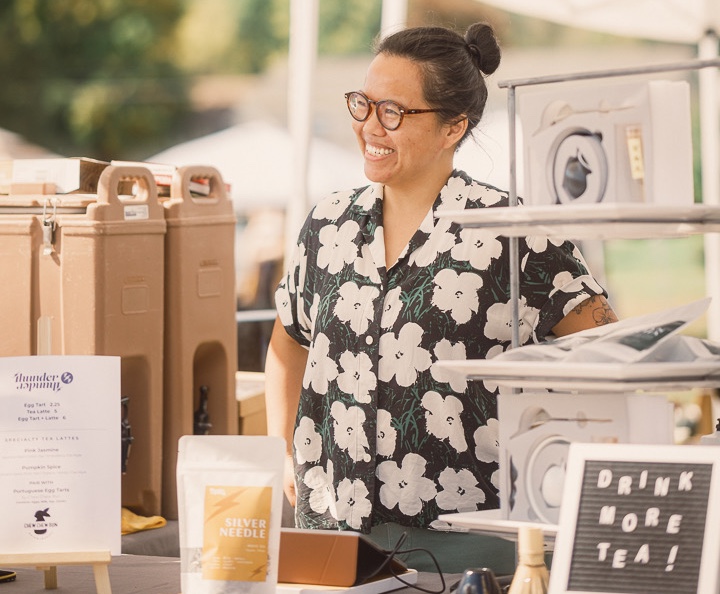This story originally appeared in The Centre County Gazette.
STATE COLLEGE — Tea is the second highest consumed beverage globally, ranking just after water, according to Statista, which recorded 7.5 billion kilograms of tea was consumed globally in 2024. Within the United States, the Tea Association of the U.S.A. Inc. noted that in 2023, Americans consumed around 96 billion servings of tea.
While the Tea Association of the U.S.A. Inc. revealed that black tea is the most consumed within the United States, one local business owner is on a mission to expand awareness within Centre County of tea varieties and the culture behind them.
Joyce Yong, owner of Thunder Thunder Tea, offers a range of teas. From traditional oolongs and green teas to a bold Lapsang Souchong — a pinewood-smoked black tea — and robust hōjicha — a tea where the leaves are roasted before being milled — Yong has something for everyone.
“Tea is for everyone, and it goes with everything,” Yong shared. “It can enhance your experience no matter what you’re doing.”
For Yong, her love of tea started as a child living in Brunei, where she attributed her grandma’s influence on her honing her ability to identify the complexities of tea.
“In my childhood, it was a very common drink to have in addition to all the standard choices. Coffee wasn’t actually as big in Brunei, where I grew up, but also my grandma, who cooks my favorite food, would always serve tea along with her dishes.”
Yong shared how during their meals together, her grandma would challenge her to analyze how the tea tasted and then try it with food and reassess the taste and try to put to words the differences in the dining experience if the tea was hot or cold.
“I think that was really helpful for young Joyce — who was already curious enough — because she gave me even more questions to be thinking about, especially when it comes to enjoying food,”
Yong said. “And then when I moved to the States when I was 12, it was a very stark culture shock of the lack of tea.”
While living in Florida, Yong noted she experienced the southern sweet tea culture and how it differed from the tea culture she experienced in Brunei. She also noticed that even in many Chinese restaurants, there were very few tea options on hand.
“Usually at a restaurant they’ll just ask you if you want oolong or herbal tea, which is usually chrysanthemum option and is a great pairing for Chinese food,” Yong explained. “But in terms of specialized cuisine, there isn’t as much of an effort to bring in teas from the different regions that the food they’re showcasing is from. And I really missed that.”
However, Yong noticed a true area of potential with the rise of third wave coffee culture, which Yong noted is “signified by ethical sourcing, transparency and supply chain, telling the story from bean to cup — sharing the producers and their process and who also you can be benefiting with your investment of this cup of coffee.”
“It’s really creating an ethos in the States, and also around the world, with this commodity product of coffee, creating a specialty culture around it,” Yong shared. “And I thought, ‘I wonder if that can be done for tea or if it will ever happen and if I can be part of creating this wave.’”
Yong then started to work in the specialty coffee scene in State College, using the experience to learn and understand the infrastructure in place that created the coffee culture and what worked and didn’t work to make it a success. Yong developed her first tea brand, Spectral Tea, in 2017 in collaboration with Rothrock Coffee. However, after the COVID-19 pandemic, Yong felt her goals for her company shift and she took over as the sole owner of the company and rebranded as Thunder Thunder Tea.
For Yong, the name of the company is significant, hailing from a ritual by the Hakka people, a nomadic tribe in China.
“Hakka people have their own languages, their own ritual and because they’re nomadic, they have a lot of melting pot type rituals and culture. There’s a tradition that they used to do whenever two Hakka families would cross paths in their travels. Together they would make time to do a tea ritual around a meal, and there would be a mortar, pestle and the different families would contribute what they harvested or foraged or traded in their journey,” Yong explained.
“And then they would pour some hot water in along with some tea leaves if anybody had that, and then they would take turns pounding it together to create like a tea soup that everybody partook in.”
This ritual Yong explained is called “pounded tea” or Lei Cha in Chinese. Lei is a homonym or a pun for thunder, Yong noted, sharing how she liked the quirk of repeating the phrase for her brand identity.
Now, Yong is on a mission to grow the tea culture in the area. In addition to online ordering, which can also be ordered for pick up at Chew Chew Bun in downtown State College, she works with local businesses and pop ups to continue to build the tea culture in Happy Valley. Yong has collaborated with Gorinto Productions and 3 Dots on a listening series that incorporated tea into a listening meditative process, as well as offered her product as a way to enhance local vintage clothing pop ups and breathwork classes. Her tea is also featured in mocktails at Chumley’s in downtown State College.
While Yong’s offerings are diverse, her ultimate goal is straightforward.
“At the end of the day, what I really want is for people to discover something new that they like,” Yong shared.
For more information on Thunder Thunder Tea, or to order, visit thunderthundertea.com.



